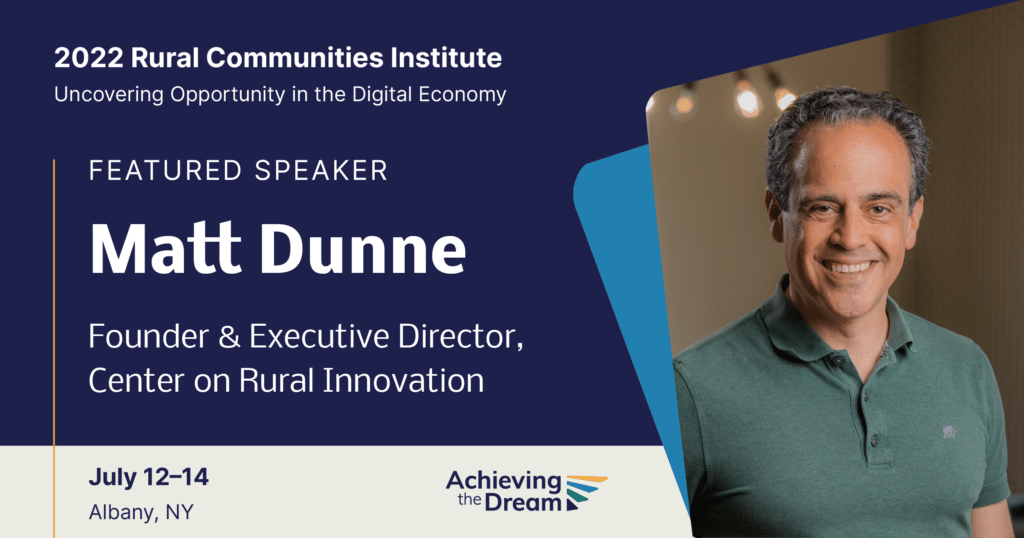Ten years ago, I visited Patrick & Henry Community College in Virginia to learn how they implemented cooperative learning to increase student success and how they taught faculty at other colleges how to employ these strategies to improve teaching and learning. It was my first site visit as a staff member at Achieving the Dream, and a great introduction to the strong leadership that rural colleges bring to the ATD Network and to the higher education field.
Rural colleges are crucial institutions for equity and economic mobility in their communities. They provide educational opportunities, workforce and economic development, and skills building. They contribute to meeting the basic needs of the students they serve, and in many cases the colleges serve as a major local employer. And while rural communities are essential to our nation’s economic well-being, they are frequently under-resourced and struggle to gain the attention of policymakers and investors.
That’s why ATD has worked closely with rural community colleges since day one. One-third of all colleges in the ATD Network serve rural communities, and many have been part of the Network since ATD first launched in 2004. We work closely with these institutions to support their work expanding opportunities in their communities, strengthening student success, and connecting learners to family-sustaining wages.
—
Rural colleges are crucial institutions for equity and economic mobility in their communities.
—
The reach of rural ATD Network colleges
Rural ATD Network colleges are in 36 states and tribal lands and include 33 Tribal Colleges and Universities that serve rural areas from New Mexico to the Northern Slope of Alaska. These institutions have always risen to meet the needs of their communities, but in the last few years have weathered unique challenges exacerbated by the COVID-19 pandemic — from the need to provide rural students remote internet access to offering support for those struggling with substance addiction.
ATD has recently launched initiatives designed to support rural colleges and partner organizations in their ongoing efforts to drive equity, access, and community vitality in a landscape changed by COVID-19.
In 2021, ATD launched Building Resiliency in Rural Communities for the Future of Work, an initiative that aims to increase equitable student success by strengthening the capacity of rural colleges to prepare students for careers in today and tomorrow’s digital economy. As a program partner, I work closely with seven community colleges as they implement whole-college reform efforts that prepare and connect students to opportunities in the digital economy, develop and strengthen community partnerships, and foster a culture of evidence. This work is also helping to build a deeper understanding across higher education for how rural colleges and their partners promote community vitality.
More recently, ATD has partnered with the Belk Center for Community College Leadership and Research at North Carolina State University on a three-year initiative to support 10 rural-serving community colleges in North Carolina. The Rural College Leaders Program (RCLP) immerses community college presidents, boards of trustees, and senior leadership teams in a professional learning community that works to increase equitable access and success for low-income students and students of color.
Bringing rural leaders together
On July 12–14, 2022, ATD will host its first Rural Communities Institute focused on uncovering opportunities in the digital economy. This event will prepare colleges to increase equitable student outcomes and drive workforce success in the digital economy. Sessions at the institute will focus on pressing topics like industry partnership strategies, equitable access for adult students, and integration of digital skills into college curricula. The program includes featured speaker Matt Dunne, founder and executive director of the Center on Rural Innovation, who will discuss industry’s demand for digital skills.
Participants of the Rural Communities Institute will also hear from Dr. Greg Hodges, the president of Patrick & Henry Community College, about how rural community colleges can serve as foundational transformation agents for the digital economy. A 2015 Leah Meyer Austin Award winner, Patrick & Henry Community College is a leading voice in rural community vitality and names partnerships with the economic development commission, chamber of commerce, and local nonprofits as transformative. Pulling from insights that the college has gained since 2004, Dr. Hodges will explore how rural colleges can effectively align their programming with labor market needs to prepare their students for the future of work.
In a way, my experience at ATD will come full circle at the Institute later this month: Ten years ago, I first saw in person the community-building work taking place in rural Virginia. Now, the college is sharing that work with dozens of other rural community colleges and Tribal Colleges and Universities across the country — institutions that are all taking unique approaches to support their own communities and operating within the digital economy. I look forward to sharing these approaches with the broader ATD Network and I’m eager to see where they take us 10 years from now.
Learn more about, ATD’s 2022 Rural Communities Institute, a highly interactive event designed to prepare colleges to increase equitable student and workforce success, particularly in the digital economy.

